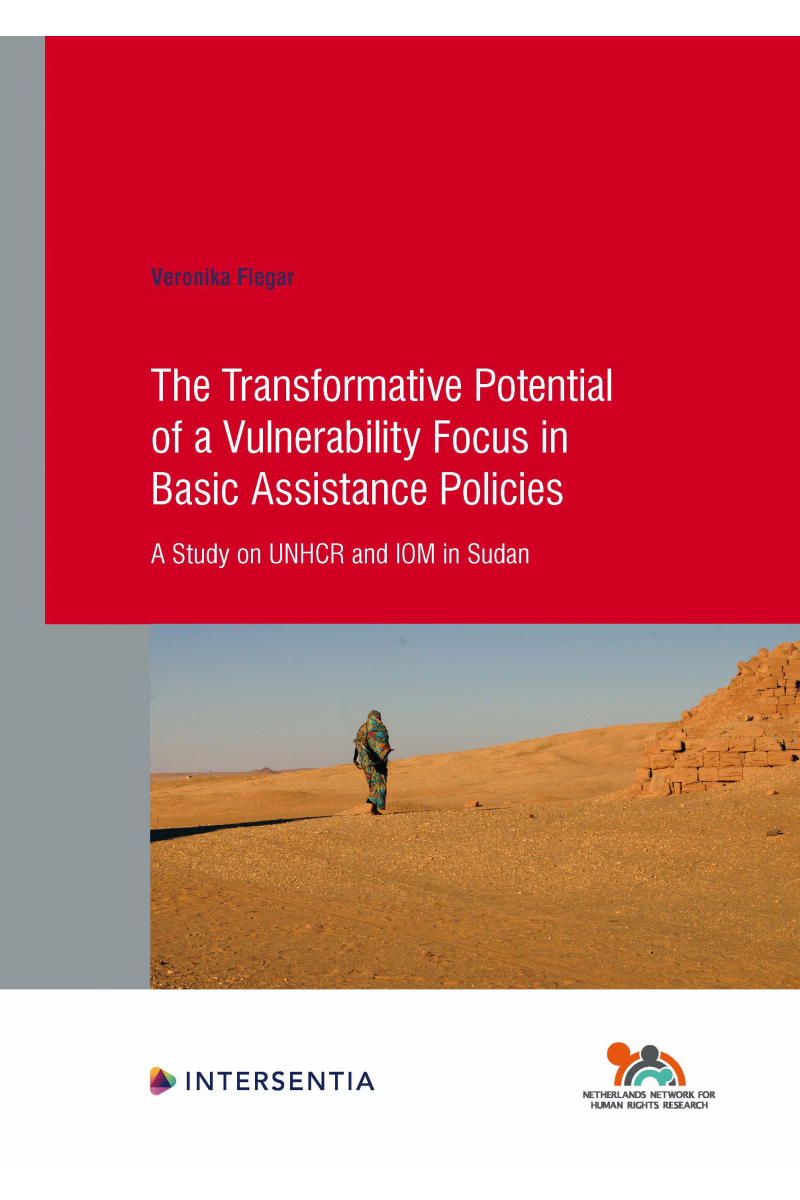 maestro
mastercard
visa
maestro
mastercard
visa

The Transformative Potential of a Vulnerability Focus in Basic Assistance Policies
A Study on UNHCR and IOM in Sudan

The term ‘vulnerability’ is often used in law and policy to refer to disadvantaged, marginalized or excluded human beings. Being ‘in a vulnerable situation’, belonging to ‘a vulnerable group’ or simply ‘being vulnerable’ are labels that policy makers, human rights advocates and others frequently use when seeking to address precariousness, deprivation, suffering and injustice. Why do we seem so fascinated by this term and its implications? What purpose and effect does the explicit pinpointing of vulnerability have? Does a focus on vulnerability actually help to improve the situation of the most disadvantaged and excluded? If so, how and under what circumstances?
With these questions in mind, this book explores how a vulnerability focus in basic assistance policies can contribute to substantive equality and therefore to the realization of universal human rights in the migration context. The book concentrates on the potential that such a vulnerability focus can have 1) to mitigate stigmatization and stereotyping and 2) to facilitate socio-economic participation. To shed light on this potential, the book relies on two case studies, both set in Khartoum, Sudan. The first case study analyzes the vulnerability-focused basic assistance policy at the United Nations High Commissioner for Refugees (UNHCR), while the second case study centres on the vulnerability-focused basic assistance policy at the International Organization for Migration (IOM). The analyses concentrate on the perspectives and perceptions of basic assistance providers (i.e. the caseworkers and their direct superiors) who design and implement the respective basic assistance policies.
The book provides deep insights into the policy practice of two UN agencies that seek to provide humanitarian assistance in the challenging operational environment of Sudan. The findings suggest normatively desirable and practically feasible procedures and activation measures that can help to provide just and effective assistance to vulnerable beneficiaries. The conclusions and recommendations in this book can therefore provide inspiration to researchers, policy makers and basic assistance providers well beyond the direct context of the two case studies.
| Type of product | Book |
|---|---|
| Format | Paperback |
| EAN / ISSN | 9781839700392 / 9781839700644 |
| Series name | Human Rights Research Series |
| Weight | 860 g |
| Status | Available |
| Number of pages | xxviii + 464 p. |
| Access to exercice | No |
| Publisher | Intersentia |
| Language | English |
| Publication Date | Oct 22, 2020 |
| Available on Strada Belgique | No |
| Available on Strada Europe | No |
| Available on Strada Luxembourg | No |
Downloads
- Table of Contents and Preliminary Pages
Veronika Flegar - Introduction
Veronika Flegar - PART I. NORMATIVE AND EMPIRICAL THEORY
- Introduction to Part I
Veronika Flegar - Normative Theory
Veronika Flegar - Themes and Concepts Relevant to the Case Studies
Veronika Flegar - PART II. BACKGROUND TO THE CASE STUDIES
- Introduction to Part II
Veronika Flegar - Methodology, Methods and Limitations of Data Collection and Analysis
Veronika Flegar - Background on the Republic of Sudan
Veronika Flegar - PART III. CASE 1: ASSESSING AND ADDRESSING VULNERABILITYAT UNHCR KHARTOUM
- Introduction to Part III
Veronika Flegar - Background on UNHCR in Sudan
Veronika Flegar - The Design of the Vulnerability Assessment for Basic Assistance at UNHCR Khartoum
Veronika Flegar - The Implementation of the Vulnerability Assessment for Basic Assistance at UNHCR Khartoum
Veronika Flegar - The Transformative Potential of a Vulnerability Focus in Case Study 1
Veronika Flegar - PART IV. CASE 2: ASSESSING AND ADDRESSING VULNERABILITY ATIOM KHARTOUM
- Introduction to Part IV
Veronika Flegar - Background on IOM in Sudan
Veronika Flegar - The Design of the Vulnerability Assessments for Basic Assistance at IOM Khartoum
Veronika Flegar - The Implementation of the Vulnerability Assessments for Basic Assistance at IOM Khartoum
Veronika Flegar - The Transformative Potential of a Vulnerability Focus in Case Study 2
Veronika Flegar - PART V.
- Final Discussion and Conclusions
Veronika Flegar